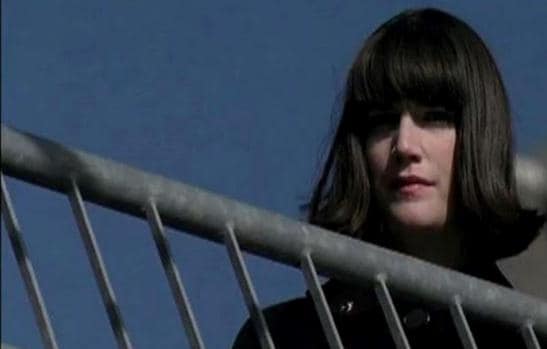Eye For Film >> Movies >> The Ninth Cloud (2014) Film Review
The Ninth Cloud
Reviewed by: Jennie Kermode

What does London bring to mind for you? It's a multifaceted city, part gleaming spires, part cardboard box hovels beside grimy canal paths, with mile upon mile of much loved but anonymous streets in between. Anonymous too are the people who drift through it, so many coming and going on the way to somewhere else. Among them is Zena (Megan Maczko). Her attempt at identity is proclaimed through a heavy black coat which she thinks makes her look as if she's just stepped out of On The Waterfront but which is in fact more redolent of Submarine. She got the idea from Bob (Michael Madsen, endearingly cast against type). Zena is in love with Bob, or thinks she is. She tells people that he's gay but that one day he might make an exception so they can be together. She tells herself that he's a great artist and she is his muse. She tells her flatmates far more than they want to know.
Bob, living in a warehouse and talking much more than doing, has a lot of big ideas but doesn't share these delusions about himself. He lets Zena hang around. Perhaps he's borrowing her dreams, having run out of his own. Together they discuss making dreams come true for other people, specifically an immigrant boy who has lost his leg. The boy lets hem tag along, but of all the characters in this meandering ensemble film, he seems the most certain about his own journey.

With artists desperate for money and bored rich kids desperate for the kudos of association with the poor, this is a broken London that seems to function despite itself. The omnipresence of characters living on fantasy affords Zena space for her own, but the determination of her actions marks her out. She is somebody who will actually act, and this threatens to bring a fragile assemblage of egos crashing down.
A brave but uneven film, The Ninth Cloud takes on difficult material and asks a lot of its audience but is thereby able to explore subjects often ignored. Its success is in large part down to Maczko, who makes Zena likeable even when she's at her most pathetic. There are still relatively few portrayals of persistent romantic delusion in film where we are not invited to mock the character in question. Watching Zena can be uncomfortable as her underlying humanity invites us to relate rather than rejecting. It even proves magnetic to Jean-Hugues Anglade's cynical Jonny, a man who tells himself he's only interested in sex but whose underlying longing for a human connection is stymied by his habitual self-centeredness.
Shot with a late Sixties, early Seventies take on visual realism that flatters nobody but gives it a lot of character, the film is sometimes comic, sometimes quietly tragic, and sometimes misses its mark. It culminates in an unusually honest portrait of dissolute lives. Only the amputee boy seems part of a coherent, living London; beyond that, the city is a stage set for players who mistakenly believe they're writing the script.
Reviewed on: 01 Oct 2014















